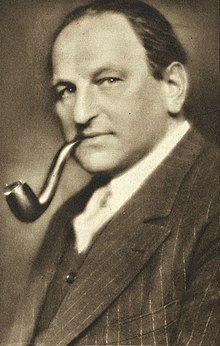Egon Friedell
Austrian philosopher, historian, journalist, actor, cabaret performer (Kabarettist) and theatre critic
Egon Friedell (born Egon Friedmann; 21 January 1878, in Vienna – 16 March 1938, in Vienna) was an Austrian cultural historian, playwright, actor and Kabarett performer, journalist and theatre critic. Before 1916, he was also known by his pen name Egon Friedländer.

Quotes
edit- Ostensibly a sequel to H. G. Wells' The Time Machine. Published in German in 1946. Translated by Eddy C. Bertin, and published in English in 1972 by Daw Books. All page numbers from this mass market paperback edition, ISBN 0-87997-727-2
- It is the politician’s profession to invent facts.
- Author’s Introduction: An Extraordinary Correspondence (pp. 20-21)
- Many things no longer appear as “miracles” to us, if we decide to look at them through the eyes of practical physics.
- To Refresh One’s Memory: A Short Lesson for the Ignorant and for Those Who Think They Know Better (p. 37)
- Strangely enough most people only do sensible things if they are ordered to.
- Chapter 2, The Mysterious Telegram (p. 50)
- “How then can you research history?”
“We don’t use the same methods as our applied among those of the Evening Countries—or rather, those which were used there. The fundaments of those methods were logical conclusions and empirical research: excavations, the study of archives, the deciphering of inscriptions. These sources are deceiving: they can have different explanations, are vague, can be ambiguous and are generally superficial. We try to approach true history along clearer and more secure paths: by looking with the inner, sympathetic senses, using our minds to draw spiritual conclusions, not logical but intuitive ones. In this way a clear, faultless view of whatever happened in world history, forward as well as backward, is shown to the Blessed among us in a series of pure images.”- Chapter 7, The Two Egyptians (p. 87)
- Extraordinary, and yet when we look in the mirror of a higher possibility it seems understandable, even self-evident.
- Chapter 7, The Two Egyptians (p. 88)
- Your history has no age, and your age has no history.
- Chapter 7, The Two Egyptians (p. 91)
- Hope and curiosity are the two big powers which force us to continue our existence in repulsive circumstances. It is exactly our not-knowing that is the thrusting power behind our most daring adventures, the constant source of our action. A man who has seen all the twists and turns of destiny and its complete unity no longer would have the courage to do anything about it. He who knows can’t act anymore.
- Chapter 7, The Two Egyptians (p. 91)